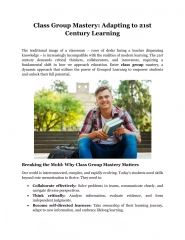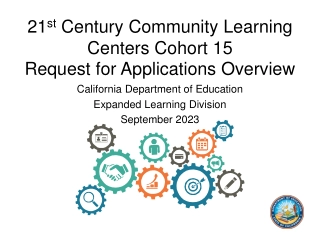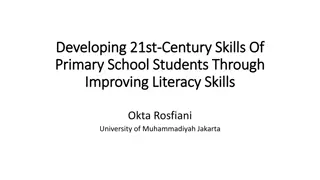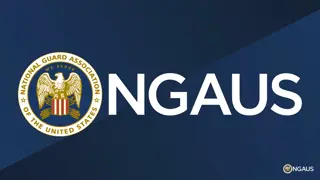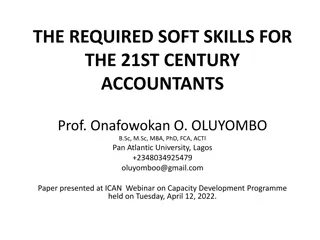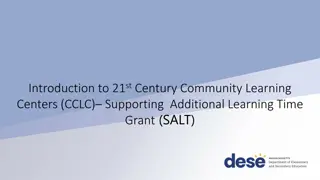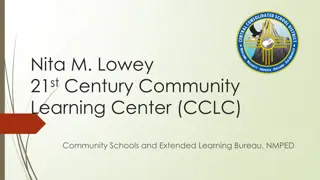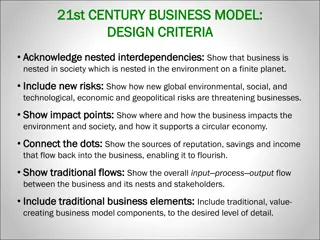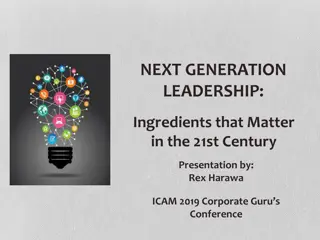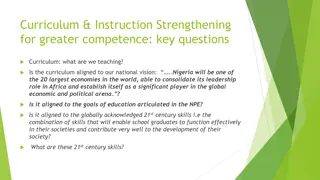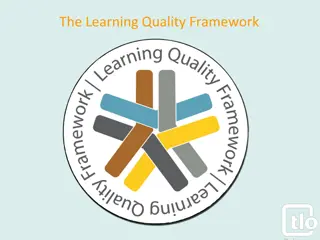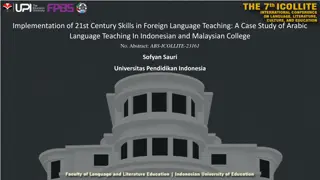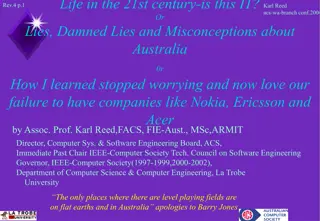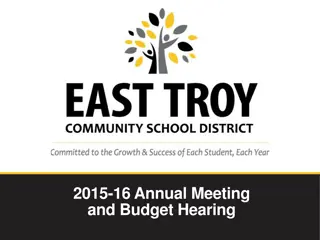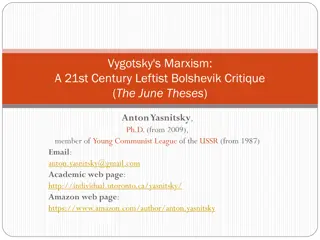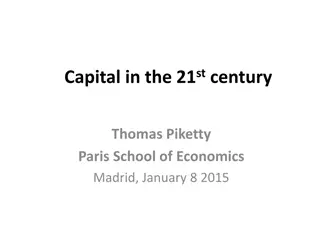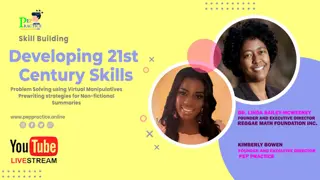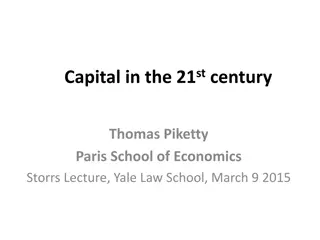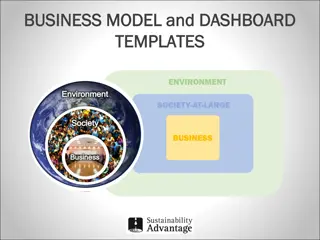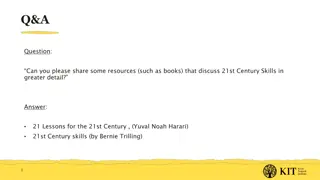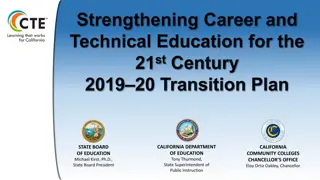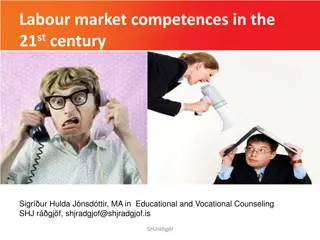
Exploring the Essence of 21st Century Skills and Framework
Delve into the significance of 21st-century skills such as critical thinking, collaboration, and creativity in preparing students for success in an evolving world. Discover the components of Learning Skills, Life Skills, and Literacy Skills, along with the 4Cs - Critical Thinking, Creativity & Innovation, Collaboration, and Communication. Uncover the importance of Information Literacy, Media Technology Literacy, and FLIPS traits - Flexibility, Adaptability, Leadership, Responsibility, Initiative, Self-Direction and Social Interaction Literacy.
Download Presentation

Please find below an Image/Link to download the presentation.
The content on the website is provided AS IS for your information and personal use only. It may not be sold, licensed, or shared on other websites without obtaining consent from the author. If you encounter any issues during the download, it is possible that the publisher has removed the file from their server.
You are allowed to download the files provided on this website for personal or commercial use, subject to the condition that they are used lawfully. All files are the property of their respective owners.
The content on the website is provided AS IS for your information and personal use only. It may not be sold, licensed, or shared on other websites without obtaining consent from the author.
E N D
Presentation Transcript
These 21st-century skills are more important to students now than ever before. Our Framework for 21st Century Learning, informed by this far-reaching partnership, communication, collaboration, creativity skills that all learners need for success in school, workand life. emphasizes the thinking 4Cs critical and They not only provide a framework for successful learning in the classroom, but ensure students can thrive in a world where change is constant and learning never stops. And they are also tremendously important for our nation s well being. Our business community demands a workforce with these skills to ensure our competitiveness in a global economy. And at a time when our civic life feels strained, we want our learners to enter the world with an understanding of what it takes to be a good citizen one who can be civically engaged, critically thinking, digitally literate, globally aware, and an effective communicator.
21st Century Skills Meaning of 21st Century Skills: The Glossary of Education defines 21st Century Skills1 as follows: The term 21st century skills refers to a broad set of knowledge, skills, work habits, and character traits that are believed by educators, school reformers, college professors, employers, and others to be critically important to success in today s world. In simple terms, 21st Century Skills refer to the skills that are required to enable an individual to face the challenges of the 21st century world that is globally- active, digitally transforming, collaboratively moving forward, creatively progressing, seeking competent human-resource and quick in adopting changes.
21st Century Skills On the basis of the historical development of 21st Century Skills, it can be stated that 21st century skills broadly consist of three main skill sets or 3 Ls - namely, Learning Skills,Life Skills and Literacy Skills. Learning Skills: skills required for the acquisition of new knowledge. Literacy Skills: skills that help in creating and gaining new knowledge through reading, media and digital resources Life Skills: skills required for successfully leading everyday life.
An easy way to understand and remember the classification is 21st Century Skills Literacy Skills Life Skills Learning Skills 4Cs IMT Flips
. 4Cs: Critical Thinking, Creativity & Innovation, Collaboration,Communication IMT: Information Literacy, Media Technology Literacy FLIPS: Flexibility and Adaptability, Leadership and Responsibility, Initiative and Self-Direction, Social and Cross-Cultural Interaction Literacy,
Learning Skills: Critical Thinking and Problem Solving: Definition Critical Thinking is the capability of objective analysis of information and includes the following qualities: fairness and open-mindedness; activeness and being informed; willingness to question or to entertain doubts; being independent. recognizing and assessing values, peer pressure and the media influences
Problem Solving: Definition Problem Solving is the skill of: identifying the relevant piece of information when faced with a mass of data (most of which is irrelevant), discarding information that may not be useful to give new information,and finally, relating one set of information to another in a different form by using experience, relating new problems to ones we have previously solved.
Creativity And Innovation These are the skills to explore and create fresh ways of thinking.Creativity refers to new way of seeing or doing things and includes four components: fluency (generating new ideas), flexibility (shifting perspective easily), originality (conceiving of something new),and elaboration (building on others' ideas). Innovative Skills mean skills for thinking creatively to develop something new/ unique / improved / distinctive. Example:Ramdev Baba s Patanjali Products.
Collaboration Collaboration is the ability to effectively work together with others. This working together while taking actions respecting others needs and perspectives contributing to and accepting the finale.Collaboration helps to develop interest and fun in the teaching learning effectively broadens the cultural, social, and boundaries and helps a child to understand environmental concerns better. skill involves and process. It environmental social and
Communication Communication refers to the ability to express one s opinions, desires, needs, apprehensions etc. oneself appropriately, verbally and non-verbally
Literacy Skills: Information Literacy, Media Literacy, Technology Literacy These skills involve the ability to access information (traditional or digital), media and technology, to understand and critically evaluate different aspects of content and information and create and communicate effectively.
Life Skills: FLIP Flexibility and Adaptability Flexibility and Adaptability refer to a person s ability to change his actions and steps taken by him according to a new situation, and efficiently facing an unprecedented satiation, without compromising on ethics and values. Adaptability can be defined as creating modifications or changes in oneself to suit the new environment.For students, these can be understood as the skills required to be flexible and adaptive to the situations around them and find the best possible solution to go forward despite adverse conditions. Example: Samsung adopted Android while Nokia stuck up with Microsoft
Leadership And Responsibility Leadership is the ability to lead a team and be capable of effective team management in relation to real world challenges. These skills teach a child how to support the development of key personal qualities such as perseverance, being committed and responsible,resilience and self-confidence and how to foster a commitment to life-long learning. Being Responsible means being a good and effective/ sensitive citizen. Be aware of the important social and national issues that may have an impact on our daily lives both as a human-being and as a student, be aware of the important social and national issues that may have an impact on lives in future both as a human -being and as a student, be aware of our fundamental duties and rights and embed the core democratic values of India and strive to live by them.
Initiative And Self Direction Initiation skill involves the ability to begin a task independently. It helps the child to build his/her own path of development. Self-direction is a skill to work with integrity on self motivation and taking initiatives
NEED OF 21ST CENTURY SKILLS Why do we need 21st Century Skills? Learning is complete and holistic only when a student is able to effectively perform and fulfill his/her responsibilities and duties towards self, school, family, society and above all, the nation. The goal is to enable today s student to be a good citizen and a responsible human-being who is well- aware of his potential and competence. Simply teaching to test or learning for exams is not going to help a student face everyday life situations. 21st Century Skills are key to the empowerment of Children and adolescents to deal with the issues and concerns related to their life. They experience a number of feelings, many of which are related to their growth development from childhood to adolescence and beyond. and
Productivity And Accountability Productivity in the student can be understood as fulfillment of any task within a given time period. Accountability can be understood as feeling responsible for any task done. Developing these skills in a student helps him/her to work effectively and also make him/ her reliable for other peers by being accountable for his/her actions.

